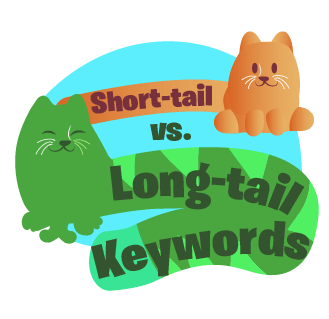Keywords play an important role in determining your overall SEO success.
They are the words and phrases users input into a search engine when looking for information, and determine which pages search engines will direct them towards.
Keywords lie at the very core of search engines; connecting searchers with webpages which will offer them the most satisfaction.

Search engines like Google will use bots to scan through your page’s text, detecting the subject matter and keywords, and then indexing that page accordingly.
By placing targeted keywords into various elements on your websites such as headings, HTML code and the content itself, you’re helping search engines to direct visitors who are interested in your page’s content.
However, to ensure you’re reaching the right searchers who are genuinely interested in what you have on offer, you need to know which words they use when trying to search.
That’s where keyword research comes in. Helping you to determine which words to target on your pages, they are essential to helping you rank highly, reach your target audience and increase your website’s leads and conversions.
In this article, we’re going to look at the two types of keywords you’ll come across during your research; short and long tail keywords, and which ones you should be prioritising on your pages.
3 types of search terms you need to know
Before delving into keyword research, it’s a good idea to learn about the different intentions of search queries. This can help you to understand what consumers are looking for and allows you to tailor your content accordingly.
There are three main types of search terms which you need to be aware of:

- Navigational – Where the searcher already knows the website they want to visit and will search for the name directly.
- Informative – Where the searcher is looking for information. These search terms are much broader and will often contain the words ‘where,’ ‘what,’ ‘why’ and ‘how.’ These search terms are typically broader, and these provide a great opportunity to increase your conversion rates.
- Transactional – Where the searcher has intent to complete an action with their search, such as subscribe to a newsletter or buy a product. Transactional search terms are the most valuable traffic segments you can target as the end-user already knows what they want and are ready to act.
Types of keywords
Once you’ve got a grasp on users’ intent, you can start to research which keywords they’re using to find your products or services. You’ll want to know about the different types of keywords available and which ones are the best to implement on your site as part of an effective content marketing strategy.
There are two main types of keywords: short-tail and long-tail. And you need to use a combination of both to achieve the best results.
Short-tail keywords

Commonly referred to as ‘generic keywords,’ these searches tend to consist of around two-to-three words.
Usually, these keywords target a larger audience as they broadly describe your product or services. They can help to target the people who are searching without a specific company, brand or location in mind. Examples include; ‘trainers’ ‘Nike trainers’ and ‘womens Nike trainers.’
Because they target a wider audience, short-tail keywords have the potential to provide a larger volume of traffic. Great – Let’s use all of them on your site!
Not quite.
Not all targeted traffic from short-tail keywords will be interested in your product or service. Lots of people using generic keywords are just looking for information in general. Though you may be getting an increase in traffic, you may not be getting any better conversions.
In addition, because these short-tail keywords have a high search volume, it means that they are highly competitive. As a result, this means they are harder to rank for on Google. Meaning you’ll need to put in a lot of hard work and wait patiently if you want to rank highly for them.
But, if you can get it right, you’ll reap the benefits of increased brand awareness and overall ranking improvements.
Long tail keywords

By comparison, targeting long tail keywords which are more specific to your business’ niche will be far less competitive. Therefore, more likely to lead to conversions.
According to recent research, more than 70% of internet searches are made up of long tail keywords. This means there are a lot of people who are looking for specific information, but it might not all be related to your line of business.
Usually consisting of more than three words, long tail keywords are much more specific. And they target a much smaller audience. Examples include; ‘nike airforce trainers size 6’ and ‘buy womens white nike airforce trainers.’
People who fall within your long tail keywords will typically know what they are looking for. As such, their phrases usually form part of transactional searches. That means they have a higher intent to purchase.
These keywords need to be very specific to the products or services you are offering. Whenever a potential customer knows what they want, they will perform a specific Google search to find it.
If your website is optimised for a specific phrase and it’s ranking highly, your visitor will land on the exact page they were looking for and will likely buy from you. Though these keywords may not be as popular, they could certainly be more valuable when it comes to increasing your conversions.
Short vs. Long Tail Keywords: Which should I use?
Each and every keyword carries a different weight in value. So you want to make sure you’re focusing on the most valuable. After all, these are the ones which will drive more traffic to your website and increase conversions.

You never want to focus on either short or long tail keywords. Yes, long tail keywords may help you with conversions in the short-term. But, if you can rank highly for them, you’ll also start to climb rankings for short tail searches. Thus, helping to provide long term growth and success.
Therefore, for the best approach, you want to implement a blend of both short and long tail keywords on your pages for optimal success.
But which ones should you use?
For ease, there are lots of keyword research tools available on the market. However, these only paint part of the picture, and can be rather costly each month if you want to invest in the best.
So, if you’re new to keyword research, why not try evaluating your keywords and their value yourself? There are some easy strategies you can try yourself, and by doing so you’ll be getting to know your target consumer even better!
Summary
For long-term SEO success, you want to conduct comprehensive keyword research to learn about your audience. Find out who your target audience is, what their search intents are, and how best you can connect with them.
Good keyword research needs to evaluate both short vs long tail keywords. Yes, ranking highly for short tail keywords can deliver volumes of traffic to your pages. But long tail keywords often attract more transactional searches and will lead to higher conversions.
The best approach is to use a combination of short and long tail keywords across your site. If you can rank highly for the less competitive long tail keywords, then you’ll be increasing your overall rankings and could end up ranking for some short tail keywords in the process.
Though it’s relatively easy (and can be cheap) to find and evaluate short and long tail keywords, it’s certainly a costly process in terms of the amount of time needed to help from them into an overall SEO strategy.
That’s where reaching out to a marketing consultant could benefit you. I have over a decade’s experience in helping companies to improve their rankings and increase revenue. As such my team and I can work with you to research, create and implement a detailed and actionable SEO strategy.
If you’re unsure whether working with a marketing consultant may be right for you and your business? Then why not get in contact? I’d love to hear more about your business and SEO goals.







